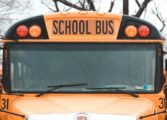Tackles teacher pay
By Heather Michon, correspondent
Members of the Fluvanna County School Board met Thursday (Jan. 18) for a half-day seminar on the budget for the 2020 fiscal year.
Chair Perrie Johnson (Fork Union), Shirley Stewart (Rivanna), and Andrew Pullen (Columbia) formed a quorum. Brenda Pace (Palmyra) and Charles Rittenhouse (Cunningham) were not in attendance.
There was one action item on the agenda: Winkler asked for approval of two make-up days in February to offset instructional time lost to snow days.
Between heavy rains and flooding in the early fall and recent bouts of snow and ice, Fluvanna County schools have already seen seven days of closures, early dismissals, and late starts.
Winkler said he couldn’t remember missing seven days at this point in the school year. “It’s the craziest fall and winter we’ve had,” he said.
Every year, the school banks up to 10 days for school closures that don’t need to be made up to meet state guidelines for the total number of instructional hours in a school year.
But with almost two months of potential weather issues ahead of them, Winkler is concerned the schools might soon run out of banked time. This reduces instructional time, which can have a negative impact on grades and test scores. Make-up days added to the end of the school year in May do not come in time for standardized testing.
After a lengthy discussion about the implications for teachers, students, and parents, the board voted to approve making Friday, Feb. 15 and Monday, Feb. 18 into school days. Previously they were scheduled as a staff day and the Presidents Day holiday.
Winkler said a notice would go out to parents Tuesday or Wednesday.
Teacher pay
Superintendent Chuck Winkler and Brenda Gilliam, director of curriculum and instruction, walked the members through the financial picture for the coming year and asked for input on many issues.
The suggestions and view of the board will be incorporated into the preliminary budget Winkler will bring back to the board Feb. 6.
Some of the lengthiest discussions centered on staff compensation.
One plan would raise most salaries by a minimum of 3 percent. Another would raise most salaries by 3 percent, plus give teachers their normal annual step increase as they move up in seniority. The board approved the “step plus 3 percent” plan.
Winkler also suggested looking at moving some of the staff, including custodians, drivers, and secretaries, to a pay band scale, which would make across-the-board pay increases easier to apply. The board asked him to survey the affected staff to see how they felt about that plan before looking at a formal proposal.
The board generally approved Winkler’s recommendations with a few nips and tucks, trimming $40,000 from one line item and $30,000 from another, and deferring some issues until a later date. All their input will be worked into the preliminary proposal and is likely to be tweaked further before it is presented to the Board of Supervisors in late February.
Wants versus needs
Budget season means going through every position and every program and thinking about what to keep and what to potentially cut. “It’s awkward and uncomfortable,” Johnson noted during the discussion, “but it’s necessary.”
The task is made more complicated by the various local, state, and federal revenue streams that form the system’s $40 million budget.
Gilliam noted that they don’t yet know what the Virginia General Assembly will do with Gov. Ralph Northam’s education budget and how it might impact their revenue. If Northam’s plan is approved, Fluvanna could see about $900,000 in additional state dollars.
“We’re in a wait-and-see what the General Assembly does,” Gilliam said.
They also have to contend with unknowns, including health insurance rates for next year and utility and fuel rates.
Winkler and Gilliam broke down “needs” and “wants” in their presentation. For example, they see a need for at least one new counselor and staff for special education, English, health and physical education, and an elective. But an apprentice coordinator and a middle school career and technical education elective are positions that would be good to have, but aren’t considered an absolute necessity.




